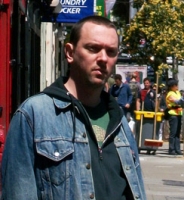Whereas
they want to kill us —
even now when I stand
with my back to the window
it’s like I might get shot
through the blinds —
kill us for our resistance to certain fixities,
for our opposition to our destruction,
for death is stasis
and that poetry moves everywhere,
for the market reduces to homogeneity
which also equates to death,
for the assertion that the poet, too,
must be able to make a living,
for our refusal to fix ourselves
in time or ink,
for the ways leopard-like we stand,
sinews and eyes,
because we will fight
for the next three thousand years
as the last three thousand
1/
the poet is a part of the people,
among the most oppressed of people
to ever sprawl on the immanent plain
of grass, instigates through movement
a vision of what (the) people can be
— if me, why not you? —
different but together and equal,
agency and valency,
multi- Multi- MULTI-
the poem is an action among
the most human (and animal) of actions,
like going into a wood,
as the drum sound on Fun House,
the syntax of those beats
recorded on magnetic tape,
as a glade of action, the poem is
momentarily a hovering hummingbird
drinking of our sweet flowers
poetry, whose flag is black and green
and might one day be a field
of red, whose party is ongoing —
we are sympathetic beings,
everyone in those houses
with the glass-brick windows
2/
no “mastery”
nor of language,
but always drifting
and drifting down its streams,
a deep-stream guerrilla
moving his/her body together
on the muddy mossy banks
on a midsummer day,
both in the forest
or the city’s indescribable alleys:
masked figures there make
such strange muses,
strange new movements
to come, whensoever and
wheresoever, future or now,
a poetic of liberation,
poems that are not like prose,
poetry has no province
but sometimes a city block aloaf
in summer leaf and ancient neon,
the backyards speckled with clover,
rough poems full of mistakes,
let narrative juxtapositions be
but a metaphor of growth
and ever more fluctuations
wreak their rhythm
on the line —
as in life,
wreak their rhythm
on the line
3/
but there may be no remedy
for our oppression inasmuch
as it is also all our common death,
in that death is the final oppression,
let us say that it will simply happen
and that I will try to be sincere —
as Ó Rathaille (“cabhair ní ghairfead”),
yet also he is freaking out
(“’s mé ag caoi ar bhóithre”)
but he cannot know death, who can,
except there is nothing more concrete
than it, nothing more concrete, which
we approach through nude symbols
or images of the dead heroes we love,
and we do love them
and love ourselves like lynxes
bounding down from the wintry copse,
down ridges and
down through the eras of change:
life = change
and death is a corpse in the snow
Issue
1
